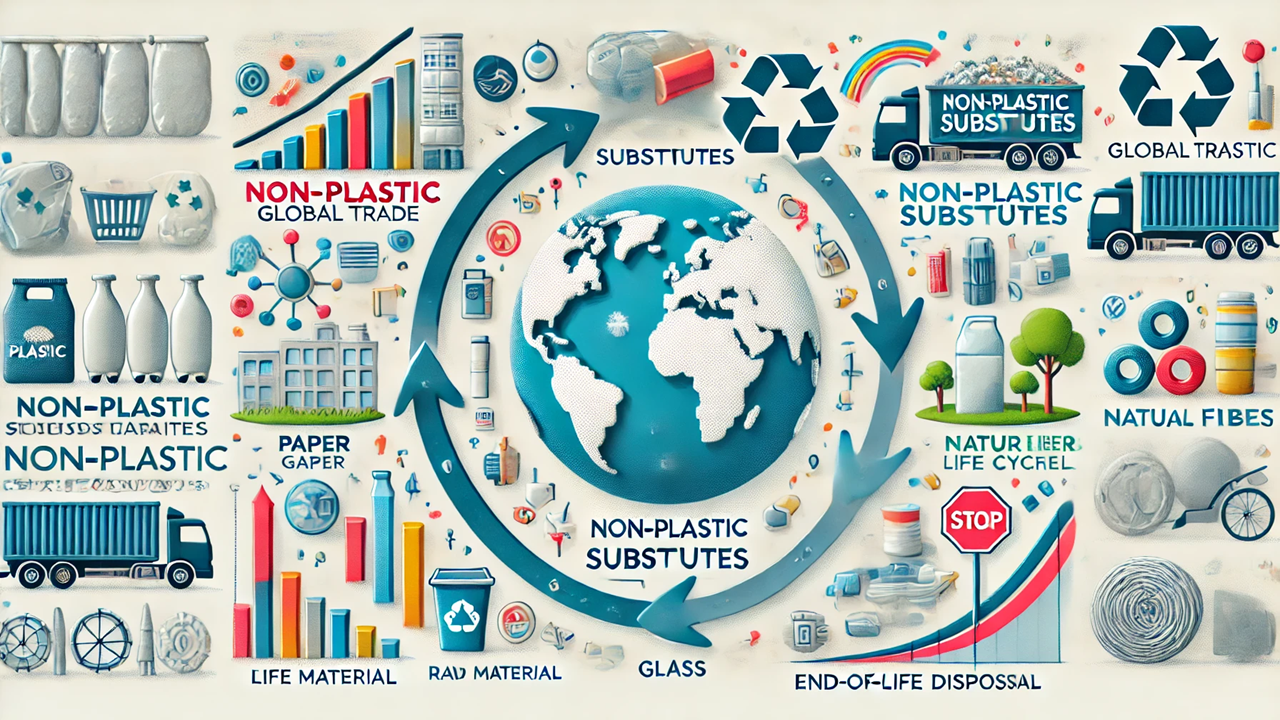Green Trade Revolution: Paving the Path Beyond Plastics
The UNCTAD report "Beyond Plastics: A Review of Trade-related Policy Measures on Non-plastic Substitutes" reveals a growing trend in trade policies promoting non-plastic substitutes like paper, glass, and natural fibers. These measures, varying from tax concessions to technical standards, aim to address the environmental and health impacts of plastic pollution. Harmonizing these policies globally is crucial for a successful transition to sustainable materials.

Global Trade and the Plastic Predicament
In a world increasingly choked by plastic pollution, a new wave of trade-related policies is steering us toward a greener future. The recent report "Beyond Plastics: A Review of Trade-related Policy Measures on Non-plastic Substitutes" by the United Nations Conference on Trade and Development (UNCTAD) sheds light on this significant shift. As global trade in plastics surged to $1.2 trillion in 2021, the need for sustainable alternatives has never been more pressing.
Plastic, celebrated for its versatility and low cost, has become a cornerstone of modern economies. Yet, its environmental toll is staggering. From oceans teeming with microplastics to overflowing landfills, the disposal challenges are daunting. The report highlights how non-plastic substitutes can mitigate these issues, provided they are biodegradable, reusable, and recyclable.
The Rise of Non-plastic Substitutes
The study identifies key non-plastic substitutes such as agricultural residues, aluminum, ceramics, glass, natural fibers, paper, seaweed, and wood cellulose. Between 2009 and 2021, 201 notifications targeting these substitutes were reported to the World Trade Organization (WTO), with measures growing at an annual average rate of 13%. These measures include regulations and support mechanisms designed to promote materials like paper, glass, and natural fibers.
Interestingly, developed countries tend to support non-plastic substitutes with active measures like tax concessions and grants. In contrast, developing countries focus more on technical standards and specifications. This divergence reflects varying levels of industrial maturity and financial capacity.
Pioneering Sustainability through Policy
Environmental requirements dominate the landscape of these measures, accounting for 86% of all notified policies. These regulations span the entire life cycle of materials, from raw material supply to end-of-life disposal. Noteworthy materials include:
Wood Cellulose, Pulp, and Paper: Measures target packaging materials and emphasizes recycling, making the paper a highly recycled material with significant environmental benefits.
Aluminum: Driven by health and safety concerns, standards focus on food contact materials, positioning aluminum as a viable plastic alternative.
Ceramics: Although mainly targeting goods with weak links to plastic substitution, some measures promote the use of handmade ceramic products in food conservation.
Glass: With its non-toxic, recyclable properties, glass is extensively regulated to promote sustainable packaging.
Agricultural Residues, Seaweed, and Algae: These materials are supported mainly through renewable energy and biofuel production incentives, highlighting their potential in non-standard applications.
Natural Fibres (Cotton, Bamboo, Jute, Wool): Measures cover various stages of the life cycle, with direct support for companies using these fibers in primary production.
Harmonizing Global Efforts for a Plastic-free Future
Despite the promising rise of non-plastic substitutes, the diversity of trade-related policy measures creates regulatory fragmentation. This poses challenges to multilateral efforts aimed at transitioning away from plastics. Harmonizing these rules is crucial, and forums like the WTO Dialogue on Plastics Pollution (DPP), the Intergovernmental Negotiating Committee (INC), and UNCTAD’s Trade and Environment Expert meetings play a vital role.
The report underscores the need for a coordinated approach to promote non-plastic substitutes through comprehensive policy measures addressing sustainability, health, and safety across their entire life cycle. Such an approach can establish standards, develop markets, and ultimately pave the way for a greener, more sustainable global trade landscape.
- FIRST PUBLISHED IN:
- Devdiscourse
ALSO READ
Canon Releases Integrated and Sustainability Report 2024
Tata Communications Secures $250M Sustainability Loan to Drive Net Zero Ambition
India's Fight for Nutritional Security Amid Sustainability Challenges
Umm Al Qaiwain implements initiatives to cement environmental sustainability
U.S. Olympic Team to Bring AC Units to Paris Games Amid Sustainability Concerns










